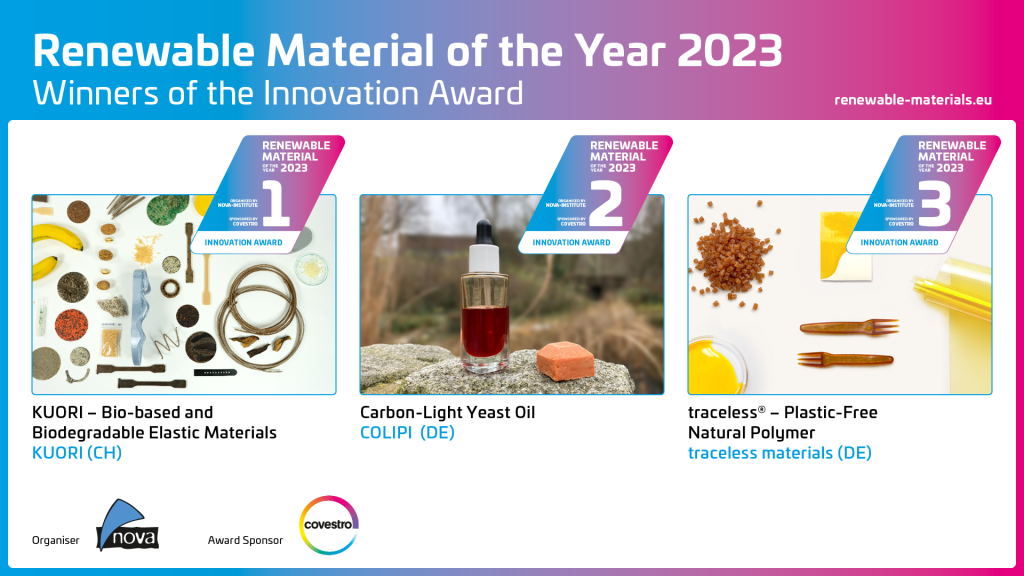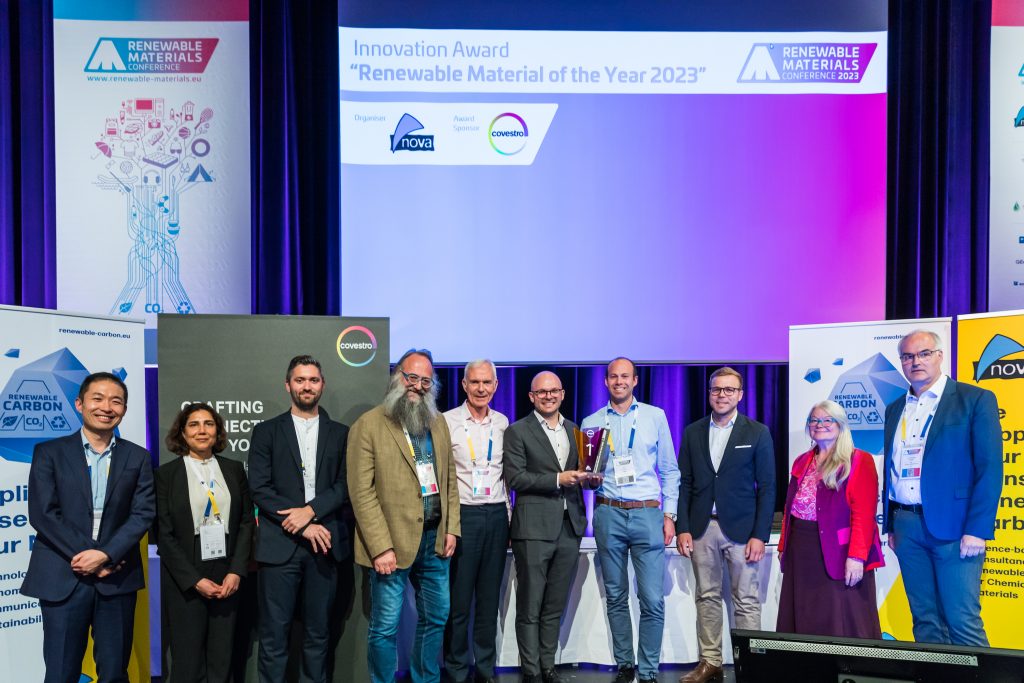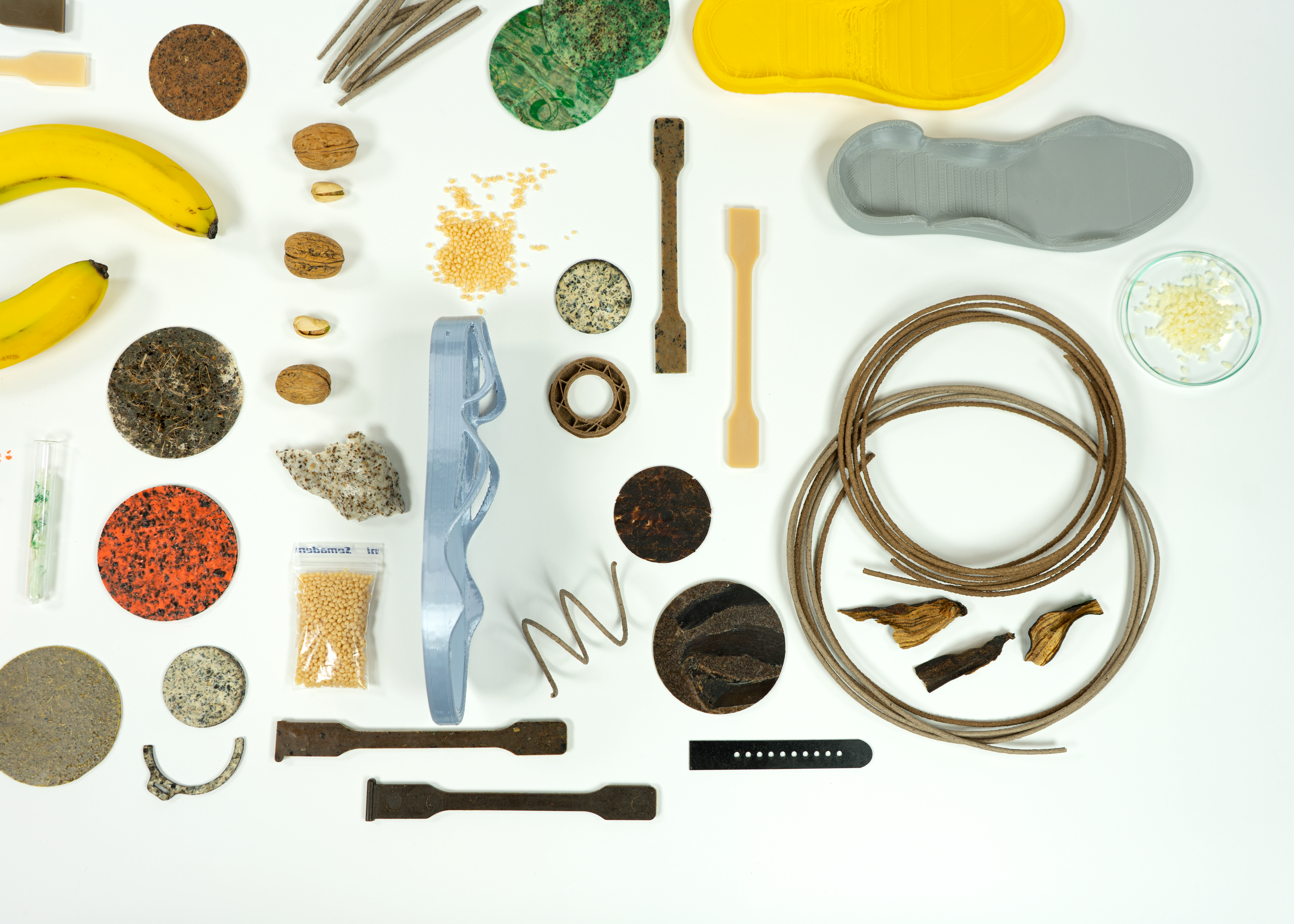
The annual Renewable Materials Conference, which took place from 23 to 25 May, is one of the largest and most important gatherings for the renewable materials industry. The new location, the conference centre “Rhein Sieg Forum” in Siegburg (near Cologne), was very well received. A record of 465 participants from 32 countries attended 80 presentations, 20 panel discussions and five workshops. Throughout the three days, a matchmaking area, long lunch breaks and three evening meeting points ensured extensive and effective networking.
A major theme of the conference was the future of the chemicals and materials industry. What can a strong, innovative and sustainable industry look like that no longer derives its carbon from fossil sources? What options are already available from bio-based products, products from CO2 and chemical recycling? What trends are emerging for the refineries of the future? Which of the new building blocks and polymers are growing faster than average and are worth investing in? What demand and impulses are coming from brand manufacturers and what political framework can accompany and support the transformation of the industry?
To achieve net-zero emissions, especially including so-called scope 3 emissions, which include feedstock and end-of-life, it is becoming increasingly clear that continued investment in fossil carbon products poses a significant risk. Investors and brand owners are putting increasing pressure on suppliers to invest rapidly in alternative carbon sources, the availability of which was a key theme at the conference.
Michael Carus, CEO of nova-Institute, an independent, science-based research and consultancy institute in Germany and organizer of the conference, sums up the current situation as follows:
“It is clear what needs to be done, the technologies exist and many companies are willing to invest in renewable solutions. What is missing now are smart policies to build the bridge between now and 2050 for companies to remain competitive in the sustainability transformation.”
The US Inflation Reduction Act sets out a policy strategy to accelerate the defossilisation of the chemical industry into one based on renewable rather than fossil carbon. How can the European Green Deal be designed to have a similar impact on green investments in Europe? A policy workshop with experts from DG Grow (Brussels) gathered proposals from industry on how to overcome barriers and strongly support this huge transformation: Today, 93 % of the carbon used for chemicals and materials in Europe comes from fossil carbon – by 2050 this must be zero!
The conference presented and discussed many possible pathways to a net-zero future for materials and chemicals. Dominik Müller, Senior Manager Sustainability & Market Development at UPM Biochemicals (FI), the platinum sponsor of the conference, summed up:
“The Renewable Materials Conference was the perfect platform to discuss with other experts how we can accelerate the transformation towards a net zero circular economy, which is only feasible with a joint holistic approach of value chain collaboration. It became clear that alternative feedstocks, such as bio-based, CO2-based and recycled feedstocks, are the key levers to enable this transformation. There is a need for clear and strong messages and commitment along the value chain from feedstock suppliers towards the chemical sector to brands to enable the industry to act faster and bolder“.

The winners of the prestigious innovation award have been chosen
With the “Renewable Material of the Year 2023” innovation award, the nova-Institute (organiser) and Covestro (sponsor) recognise three particularly exciting and promising solutions that contribute to replacing fossil carbon from the ground. Thirty companies responded to the call for entries, six nominees presented their innovations at the conference and three were selected by the participants of the Renewable Materials Conference.
Christoph Gürtler, Head of Global Industry Academia Cooperations at Covestro (DE), congratulated the winner:
“With Kuori (CH) working on bio-based and biodegradable elastic materials, e.g. for shoe sole applications, the audience selected a highly interesting topic for the prestigious Renewable Materials of the Year Award 2023. We congratulate the winner and are proud to sponsor this award and to have a long-term relationship with the nova Institute and the Renewable Carbon Initiative. It is a very fruitful collaboration and the Renewable Materials Conference in Siegburg was a great success.”Raul Schweizer, Chief Operating Officer von KUORI (CH):
“It is a privilege for us to be selected by international experts from industry and research as the ‘Renewable Material of the Year 2023’. The positive spirit and will to change towards a circular economy is in line with our company values and mission. We have had the opportunity to discuss this with international companies, made valuable contacts and look forward to more.”
And here are the three winners:

First Winner: KUORI – Bio-based and Biodegradable Elastic Materials (KUORI (CH))
Kuori is developing and producing bio-based and biodegradable elastic materials based on food waste such as banana peels and nutshells, which are sustainable alternatives for conventional elastic materials in various applications.
The first use case are shoe soles. The company is working together with shoe producers who make soles from the innovative materials. This avoids the accumulation of persistent microplastics and offers an ecological end of life perspective for the product.
The materials can be fully reintegrated into the biological cycle by industrial composting. Hence, the materials enable a circular business model for shoe producers and other manufacturers of goods.
More information: www.kuori-materials.com

Second Winner: Carbon-Light Yeast Oil (COLIPI (DE))
COLIPI develops innovative bioprocesses for the transformation of CO2 to sustainable carbon-light alternatives to plant oils like palm oil. The core innovation and enabler is a patented gas fermentation bioreactor that safely unlocks world’s fastest CO2 utilizing microorganisms which turn off-gasses containing CO2 (directly), H2 and O2 to carbohydrate rich biomass. These biomass and/or industrial organic side streams serve as feedstock for heterotrophic fermentations, e.g. yeast oil fermentation.
Certain yeast strains have the strength of feedstock agnosticism: a vast variety of different feedstocks can serve as carbon source, among others C5 sugars, C6 sugars, volatile fatty acids, and fat residues. Colipi is actively engaged in joint research and development with large corporations which provide potential feedstocks whereas Colipi tests them for purpose fit. The product consists of triacylglycerides, in composition equivalent to those of plants e.g. oil palm, mainly consisting of C16:0, C18:0 and C18:1 fatty acids. Further valuable molecules like antioxidative vitamins namely astaxanthin, tocopherols, and other carotenoids are produced.
Life cycle assessments and techno economic analyses were conducted, expressing both: unparalleled low CO2 footprints of the products and economic viability. The fermentation with two separate process steps will in future be simplified to a one-step process.
More information: www.colipi.com

Third Winner: traceless® – Plastic-Free Natural Polymer (traceless materials (DE))
traceless® is part of a new generation of plastic-free natural polymer materials that go beyond bio-based or biodegradable plastics. The material is based on plant residues of the agricultural industry and contains 100 % bio-based carbon content – hereby supporting the transition from fossils to renewables, while additionally avoiding direct food conflict. Furthermore traceless® is a toxic-free and climate friendly solution, as the production and disposal emit up to 95 % less CO2 compared to conventional plastics. The patent-pending production technology is scalable and efficient, saving by average 83 % of fossil energy demand during production. And even though traceless® looks and feels like plastic, the material is certified plastic- and microplastic-free and fully bio-circular – designed to leave no trace. The start-up produces traceless® as a base material in granulate form.
The plastics and packaging industry can further process this granulate to rigid applications, flexible films, coatings or adhesives, using standard converting technologies. This way, traceless® can be used in a wide variety of end products – from single-use products over rigid and flexible packaging to products with high abrasion and coating & adhesive solutions.
More information: www.traceless.eu
Sponsoring
The innovation award was sponsored by Covestro (DE), Platinum Sponsor is UPM Biochemicals (FI). Many thanks to our Gold Sponsors Alfa Laval (SE), CovationBio (US), GS Biotech (CN), iff (US), NESTE (FI), Sappi (NL/ZA), TUEV Austria (AT), Sugar Energy (CN) as well as our Bronze sponsors BASF (DE), DIN CERTCO (DE), ECHO Instruments (SI), FKuR (DE), GEA (DE), Heraeus (DE), JRS (DE) and Sulzer (CH). Finally, we thank Borealis (AT) as sponsor of the “Get Together” session.
Partners
The Renewable Materials Conference was supported by industry and trade associations, non- profit organisations, research institutions and interest groups that are thematically linked to the conference: AVK (DE), BBIA (UK), BCNP Consultants (DE), C.A.R.M.E.N. (DE), CLIB – Cluster industrielle Biotechnologie (DE), CO2Value (Europe), CSCP – Collaborating Centre on Sustainable Consumption and Production (DE), EEN – Enterprise Europe/Zenit (EU), European Bioplastics (EU), FNR-Fachagentur Nachwachsende Rohstoffe (DE), GO!PHA (International), IBB – Industrielle Biotechnologie Bayern Netzwerk (DE), ITA – Institut für Textiltechnik der RWTH Aachen (DE), kunststoffland NRW (DE), NRW.Energy4Climate (DE), ÖGUT – Österreichische Gesellschaft für Umwelt und Technik (AT), Plastics Europe (DE) und Renewable Carbon Initiative (International).
The conference proceedings will be available from mid-June for €200:
https://renewable-carbon.eu/publications/?search=1&publication-type=proceedings
About nova-Institute
Source
nova-Institute, press release, 2023-05-31.
Supplier
Alfa Laval
AVK – Industrievereinigung Verstärkte Kunststoffe e.V.
BCNP Consultants
Bio-based and Biodegradable Industries Association (BBIA)
Borealis Polyolefine AG
C.A.R.M.E.N. e.V.
Cluster Industrielle Biotechnologie e.V. (CLIB2021)
CO2 Value Europe
Covation Biomaterials
Covestro AG
DIN CERTCO Gesellschaft für Konformitätsbewertung
ECHO
European Bioplastics e.V.
Fachagentur Nachwachsende Rohstoffe e.V. (FNR)
FKuR Kunststoff GmbH
GO!PHA
GS Biotech
Heraeus Group
Industrielle Biotechnologie Bayern Netzwerk GmbH (IBB Netzwerk GmbH)
Institut für Textiltechnik (ITA) – RWTH Aachen
kunststoffland NRW e.V.
Neste Corporation
nova-Institut GmbH
Österreichische Gesellschaft für Umwelt und Technik (ÖGUT)
Plastics Europe
Renewable Carbon Initiative (RCI)
Sappi Global
Sulzer Chemtech Ltd.
TÜV AUSTRIA Group
UPM Corporation
Share
Renewable Carbon News – Daily Newsletter
Subscribe to our daily email newsletter – the world's leading newsletter on renewable materials and chemicals












